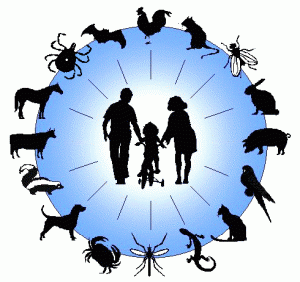A Zoonotic disease, is one that, by definition, “is transmissible from animals to humans under natural conditions
and can also be an infection or disease that is transmissible between animals
and
and can also be an infection or disease that is transmissible between animals
and
humans”. This is particularly important as the strength of the
human-animal bond continues to grow and develop between ourselves and our
companion animals.
Studies have shown that not only do people in the community
lack general knowledge about the scope, importance and prevalence of zoonotic
disease, but more alarmingly, a survey of physicians themselves, has found a
lack adequate knowledge and awareness of zoonotic disease as well as general discomfort
in addressing and communicating these public health threats and concerns to
their human patients.
lack general knowledge about the scope, importance and prevalence of zoonotic
disease, but more alarmingly, a survey of physicians themselves, has found a
lack adequate knowledge and awareness of zoonotic disease as well as general discomfort
in addressing and communicating these public health threats and concerns to
their human patients.
In contrast, accredited veterinary schools are required to
provide instructional education about zoonotic disease to veterinary students
as a requirement of being recognized as an accreditated school. In particular, courses highlighting the
importance of epidemiology, zoonoses, food safety, the complex interrelationship
of animals and the environment and the overall contribution of veterinarians to
general public health is a curriculum requirement for most, if not all,
veterinary students. No such accreditation requirement exists in U.S. medical
schools.
provide instructional education about zoonotic disease to veterinary students
as a requirement of being recognized as an accreditated school. In particular, courses highlighting the
importance of epidemiology, zoonoses, food safety, the complex interrelationship
of animals and the environment and the overall contribution of veterinarians to
general public health is a curriculum requirement for most, if not all,
veterinary students. No such accreditation requirement exists in U.S. medical
schools.
So, how does this affect you, the pet owner?
Well,
considering over 50% of all US households have one or more pets, the potential
risk of contracting a zoonotic disease is a clear and present concern.
considering over 50% of all US households have one or more pets, the potential
risk of contracting a zoonotic disease is a clear and present concern.
What are some examples of Zoonotic Diseases?
The list is
exceedingly long, but here are some of the more well-know examples of zoonotic
diseases: HIV, Ebola, Bubonic plague, Rabies, intestinal parasites (giardia,
roundworms, tapeworms, etc), ringworm, salmonella, Lyme Disease, influenza, E.
Coli, Dirofilariasis (heartworm disease), chlamydia, bartonella, anthrax,
leprosy, tuberculosis, West Nile, Zika virus, eastern/western/venezuelan
encephildes and the list goes on and on.
exceedingly long, but here are some of the more well-know examples of zoonotic
diseases: HIV, Ebola, Bubonic plague, Rabies, intestinal parasites (giardia,
roundworms, tapeworms, etc), ringworm, salmonella, Lyme Disease, influenza, E.
Coli, Dirofilariasis (heartworm disease), chlamydia, bartonella, anthrax,
leprosy, tuberculosis, West Nile, Zika virus, eastern/western/venezuelan
encephildes and the list goes on and on.
So what can you do to lower the risk of contracting a
zoonotic disease?
zoonotic disease?
1.
Ensure you are properly handling, storing and
cooking all food intended for human consumption. The importance of this has
been highlighted with the recent Raw Food pet diet trend (not to mention this
is NOT a nutritionally complete nor well- balanced approach to meeting your
pet’s nutritional needs).
Ensure you are properly handling, storing and
cooking all food intended for human consumption. The importance of this has
been highlighted with the recent Raw Food pet diet trend (not to mention this
is NOT a nutritionally complete nor well- balanced approach to meeting your
pet’s nutritional needs).
2. Good personal hygiene and hand-washing practices.
3. Ensuring all pets are on monthly, year-round
flea, tick and heartworm prevention. Protecting yourself against insect vectors
is also extremely important.
flea, tick and heartworm prevention. Protecting yourself against insect vectors
is also extremely important.
4. Prompt yard clean up/litter box maintenance
practices.
practices.
5. Maintaining your pet’s annual/semi-annual
immunizations. Maintaining your immunization status is equally important.
immunizations. Maintaining your immunization status is equally important.
For more information, please don’t hesitate to reach out to
Companion Animal Hospital’s friendly and knowledgeable veterinary staff
members. Additional reading materials, a complete list of zoonotic diseases and
references for this article can also be found at www.cdc.gov.
Companion Animal Hospital’s friendly and knowledgeable veterinary staff
members. Additional reading materials, a complete list of zoonotic diseases and
references for this article can also be found at www.cdc.gov.
Written By: Dr. Christine Tuma
Companion Animal Hospital Round Lake
What's Next
Call us or schedule an
appointment online.Meet with a doctor for an
initial exam.Put a plan together for
your pet.


